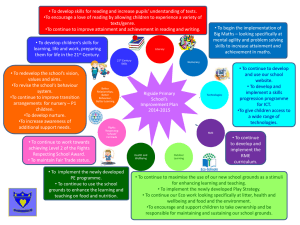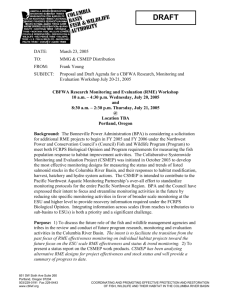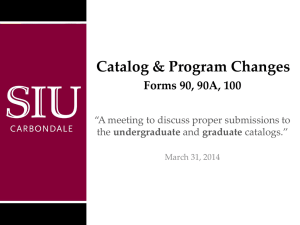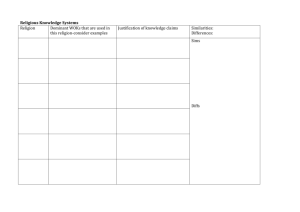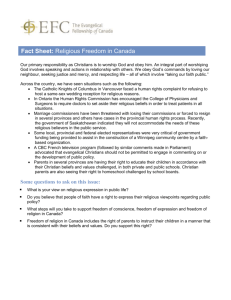Religious and moral education: Experiences and outcomes
advertisement
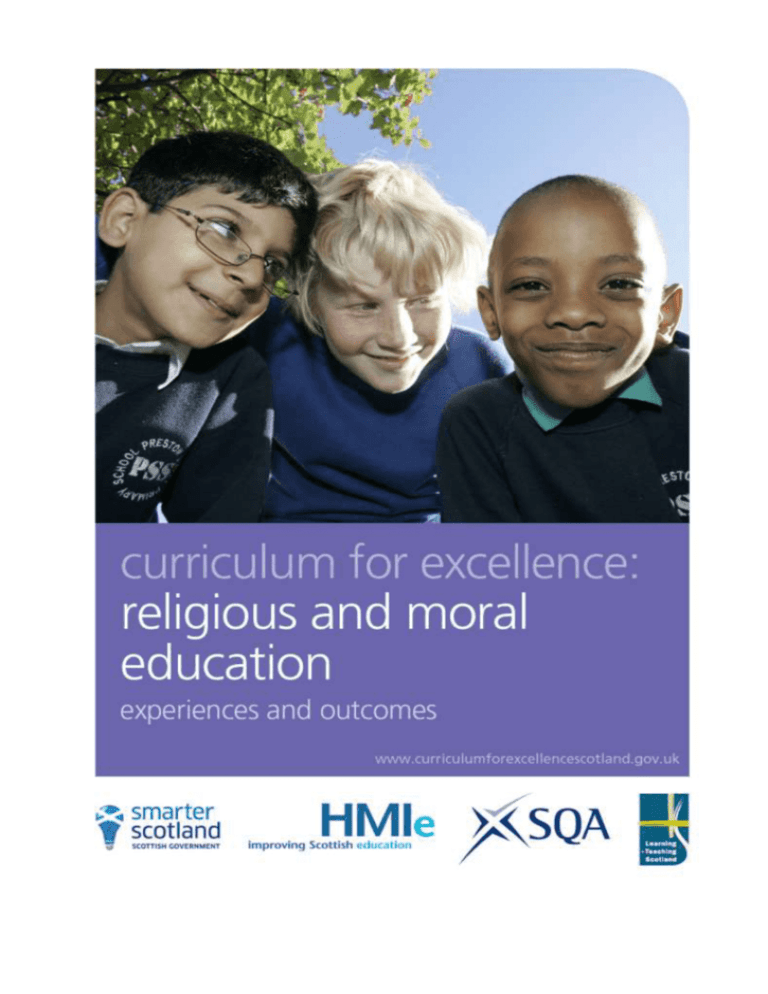
Religious and moral education Experiences and outcomes Learning through religious and moral education1 enables me to: 1 recognise religion as an important expression of human experience learn about and from the beliefs, values, practices and traditions of Christianity and the world religions selected for study, other traditions and viewpoints independent of religious belief explore and develop knowledge and understanding of religions, recognising the place of Christianity in the Scottish context investigate and understand the responses which religious and non-religious views can offer to questions about the nature and meaning of life recognise and understand religious diversity and the importance of religion in society develop respect for others and an understanding of beliefs and practices which are different from my own explore and establish values such as wisdom, justice, compassion and integrity and engage in the development of and reflection upon my own moral values develop my beliefs, attitudes, values and practices through reflection, discovery and critical evaluation develop the skills of reflection, discernment, critical thinking and deciding how to act when making moral decisions make a positive difference to the world by putting my beliefs and values into action establish a firm foundation for lifelong learning, further learning and adult life. Religious education has a statutory position in Scottish education, relating to schools but not to pre-school centres. Religious and moral education: experiences and outcomes 1 Christianity Beliefs Early First As I explore Christian stories, images, music and poems, I am becoming familiar with some beliefs Christian people have about God and Jesus. Through exploring Bible stories, I can describe some beliefs Christians have about God and Jesus. RME 1-01a Second Through investigating and reflecting upon biblical and other Christian stories, I can show my understanding of these stories. RME 2-01a RME 0-01a Third Fourth Having reflected upon Christian sources, I can explain some key Christian beliefs about God, Jesus, the human condition and the natural world, and how these beliefs lead to actions for Christians. Having considered key Christian beliefs, I can express reasoned views on these and discuss how putting them into practice might affect individuals and society. I can confidently support my own responses to these issues of belief. RME 3-01a RME 4-01a By exploring some places and investigating artefacts, I am developing my knowledge of Christian beliefs and my awareness of the role of Christianity in Scottish society and the world. Through exploring the lives and teachings of Jesus and other figures in Christianity, I am increasing my knowledge and understanding of key Christian beliefs. RME 2-01b Through investigating and reflecting upon how Christians put their beliefs into action, I can reflect upon the consequences of putting my own beliefs into action. RME 3-01b RME 1-01b I can talk about my own beliefs, or express them in other ways. RME 1-01c I can show understanding of Christian beliefs and explore the similarities and differences between these and my developing beliefs. RME 2-01c I can explain a range of beliefs which Christians hold about ‘ultimate questions’ and participate in debates about these. RME 3-01c I can give examples of the contribution of Christian beliefs to the development of Scotland, now and in the past. I can explain the contribution of Christian beliefs to the development of Scotland, now and in the past. RME 4-01b RME 3-01d Religious and moral education: experiences and outcomes 2 Christianity (continued) Values and issues Early First Second Third Fourth As I play and learn, I am developing my understanding of what is fair and unfair and the importance of caring for, sharing and cooperating with others. Having explored biblical and other Christian stories, I can show my developing understanding of key values of Christianity and how they might be put into action in people’s lives and communities. Through investigating and reflecting upon the lives and teachings of Jesus and key Christian figures, and drawing upon moral values as expressed in Christianity, I am beginning to understand how these have influenced Christian morality. Having reflected upon Christian responses to issues of morality, I can discuss ways in which to create a more just, equal, compassionate and tolerant society. Through exploring a range of issues of morality, I can consider Christian responses to these issues and relate these to my own developing values. RME 0-02a RME 4-02a RME 3-02a RME 2-02a RME 1-02a I can describe the key features of the values of Christianity which are expressed in stories. RME 1-02b I can share my developing views about values such as fairness and equality and love, caring, sharing and human rights. RME 2-02b I can demonstrate my developing understanding of moral values through participating in events and projects which make a positive difference to others. RME 3-02b I can apply my developing understanding of morality to consider a range of moral dilemmas in order to find ways which could promote a more just and compassionate society. RME 4-02b I can describe how the values of Christianity contribute to as well as challenge Scottish and other societies. I can explain how the values of Christianity contribute to as well as challenge Scottish and other societies. RME 4-02c RME 3-02c Religious and moral education: experiences and outcomes 3 Christianity (continued) Early Practices and traditions I am becoming aware of the importance of celebrations, festivals and customs in Christian people’s lives. RME 0-03a First Second Third Through investigating the Christian communities in my local area, I am discovering how Christian communities demonstrate their beliefs through prayer, worship and special ceremonies. I am developing respect for the practices and traditions of others. I am increasing my knowledge and understanding of different forms of Christian worship and artefacts and can explain their importance for Christians. Fourth RME 2-03a Through investigation of and reflection on Christian traditions, practices and customs, I can explain the significance of these for Christians across a range of Scottish Christian Traditions. RME 1-03a Through researching a range of Christian traditions, practices and customs, I can explain their significance across a range of Christian Traditions. I can consider the place of these in the contemporary religious life of Scotland. RME 4-03a RME 3-03a I am developing an awareness of the ways in which Christians celebrate different times of year and can relate these to my own life and community. Through investigating the ways in which Christians mark major life events and times of year, I can explain key features of such festivals and celebrations. I am able to reflect upon my own responses to the challenges and opportunities presented by religious and cultural diversity and extend this reflection from the Scottish to the global context. RME 2-03b RME 1-03b RME 4-03b I can describe the practices and traditions of Christianity and have considered the way these have influenced Scottish society. RME 2-03c Religious and moral education: experiences and outcomes I am developing my understanding of Scotland’s religious diversity within Christianity and of the place of religion in society. RME 3-03b 4 World religions selected for study Beliefs Early First As I explore stories, images, music and poems, I am becoming familiar with the beliefs of the world religions I am learning about. Through exploring stories from world religions, I can describe some of their key beliefs. RME 1-04a Second Third Through investigating and reflecting upon stories of world religions, I can show my understanding of these stories. RME 2-04a RME 0-04a Fourth Having reflected upon sources from world religions, I can explain some key beliefs about deity, the human condition and the natural world, and how these beliefs lead to actions for followers of those religions. RME 3-04a Having considered the key beliefs of world religions, I can express reasoned views on these and discuss how putting them into practice might affect individuals and society. I can confidently support my own responses to these issues of belief. RME 4-04a By exploring some places and investigating artefacts, I am developing my knowledge of the beliefs of world religions and my awareness of their role in Scottish society and the world. Through exploring the lives and teachings of significant figures from world religions, I am increasing my knowledge and understanding of their key beliefs. RME 2-04b Through investigating and reflecting upon how followers of world religions put their beliefs into action, I can reflect upon the consequences of putting my own beliefs into action. RME 3-04b RME 1-04b I can talk about my own beliefs, or express them in other ways. RME 1-04c I can show understanding of the beliefs of world religions and explore the similarities and differences between these and my developing beliefs. RME 2-04c I can explain a range of beliefs which followers of world religions hold about ‘ultimate questions’ and participate in debates about these. RME 3-04c I can give examples of the contributions of the beliefs of world religions to the development of Scotland, now and in the past. I can explain the contributions of the beliefs of world religions to the development of Scotland, now and in the past. RME 4-04b RME 3-04d Religious and moral education: experiences and outcomes 5 World religions selected for study (continued) Values and issues Early First Second As I play and learn, I am developing my understanding of what is fair and unfair and the importance of caring for, sharing and cooperating with others. Having explored stories from world religions, I can show my developing understanding of key values of those faiths and how they might be put into action in people’s lives and communities. Through investigating and reflecting upon the lives and teachings of significant figures from world religions, and drawing upon moral values as expressed in religious scriptures and other stories, I am beginning to understand how these have influenced the morality of world religions. RME 0-05a RME 1-05a Third Fourth Through investigating and reflecting upon the responses of world religions to issues of morality, I can discuss ways in which to create a more just, equal, compassionate and tolerant society. Through exploring a range of issues of morality, I can consider the responses of world religions to these issues and relate these to my own developing values. RME 4-05a RME 3-05a RME 2-05a I can describe the key features of the values of world religions which are expressed in stories. RME 1-05b I can share my developing views about values such as fairness and equality and love, caring, sharing and human rights. RME 2-05b I can demonstrate my developing understanding of moral values through participating in events and projects which make a positive difference to others. RME 3-05b I can apply my developing understanding of morality to consider a range of moral dilemmas in order to find ways which could promote a more just and compassionate society. RME 4-05b I can describe how the values of world religions contribute to as well as challenge Scottish and other societies. I can explain how the values of world religions contribute to as well as challenge Scottish and other societies. RME 4-05c RME 3-05c Religious and moral education: experiences and outcomes 6 World religions selected for study (continued) Early Practices and traditions I am becoming aware of the importance of celebrations, festivals and customs in religious people’s lives. RME 0-06a First I am discovering how followers of world religions demonstrate their beliefs through prayer/meditation, worship and special ceremonies. I am developing respect for the practices and traditions of others. Second Third I am increasing my knowledge and understanding of different forms of worship and artefacts within world religions and can explain their importance for followers of world religions. Fourth I have researched and reflected upon the major ceremonies and customs of world religions and can explain the significance of these to the followers of these religions. Through researching a range of traditions, practices and customs of world religions, I can consider the place of these in contemporary life. RME 4-06a RME 3-06a RME 2-06a RME 1-06a I am developing an awareness of the ways in which followers of world religions celebrate different times of year and can relate these to my own life and community. RME 1-06b Through investigating and reflecting upon the ways in which followers of world religions mark major life events and times of year, I can explain key features of such festivals and celebrations. RME 2-06b I can describe and reflect upon practices and traditions of world religions. RME 2-06c I am developing my understanding of Scotland’s religious diversity as well as the place of religion in society. RME 3-06b I am able to reflect upon my own responses to the challenges and opportunities presented by Scotland’s religious and cultural diversity and extend this reflection to the global context. RME 4-06b Religious and moral education: experiences and outcomes 7 Development of beliefs and values These experiences and outcomes should be addressed through the context of the experiences and outcomes for Christianity and world religions selected for study. They should not be seen as a separate area to plan for but should be intertwined with the experiences and outcomes for Christianity and the world religions selected for study. They should also enable consideration of a range of spiritual traditions and viewpoints which are independent of religious belief. Early First Second Third I am developing respect for others and my understanding of their beliefs and values. Fourth RME 0-07a / 1-07a / RME 2-07a / RME 3-07a / RME 4-07a I am developing an increasing awareness and understanding of my own beliefs and I put them into action in positive ways. RME 1-08a / RME 2-08a / RME 3-08a / RME 4-08a As I play and learn, I am developing my understanding of what is fair and unfair and why caring and sharing are important. I am developing an awareness that some people have beliefs and values which are independent of religion. RME 0-09a RME 1-09a I am increasing my understanding of how people come to have their beliefs, and further developing my awareness that there is a diversity of belief in modern Scotland. Through reflection and discussion, I can explain a range of beliefs which people hold and can participate in debates about ‘ultimate questions’. RME 3-09a RME 2-09a Having reflected upon and considered a range of beliefs, belief systems and moral viewpoints, I can express reasoned views on how putting these beliefs and values into action might lead to changes in society. RME 4-09a I am developing my understanding that people have beliefs and values based upon religious or other positions. RME 2-09b I am developing my own understanding of values such as honesty, respect and compassion and am able to identify how these values might be applied in relation to moral issues. RME 3-09b I am able to apply my understanding of a range of moral viewpoints, including those which are independent of religion, to specific moral issues and am aware of the diversity of moral viewpoints held in modern Scotland and the wider world. RME 4-09b Religious and moral education: experiences and outcomes 8 Development of beliefs and values (continued) Early First Second Third Fourth I can show my understanding of values such as caring, sharing, fairness, equality and love. I can explain why different people think that values such as honesty, respect and compassion are important, and I show respect for others. I can explain how the different beliefs that people have, including beliefs which are independent of religion, relate to their moral viewpoints and how this leads them to respond to moral issues. I can explain my own responses to the benefits and challenges presented by the increasing diversity of belief to modern Scotland and the wider world. RME 1-09b RME 2-09c RME 4-09c RME 3-09c I am becoming aware that people’s beliefs and values affect their actions. RME 1-09c I am developing my understanding of how my own and other people’s beliefs and values affect their actions. I am developing my understanding of the nature of belief and morality. RME 3-09d I am able to offer a basic analysis of the origins and development of beliefs and morality. RME 4-09d RME 2-09d I can apply philosophical enquiry to explore questions or ethical issues. RME 4-09e Religious and moral education: experiences and outcomes 9 Appendix – Explanations 0-01a, 1-01a, 2-01a The Bible stories chosen would be appropriate to the context and the pupil. It would also be important to ensure that the ‘message’ in the story is a focus, for example, the Noah’s Ark story should explore issues such as punishment, forgiveness and the nature of God. Great care should be taken to ensure that pupils are aware that each faith may understand the story with a different emphasis – stressing the importance again of close liaison with local faith representatives. 2-01b Key Christian figures might be Biblical characters other than Jesus – for example, the disciples and Paul. They could also be figures from a particular brand of Christianity’s historical tradition such as Popes and Patriarchs, Saints or other notable Christian figures and should include more contemporary Christian figures. 3-01a The ‘human condition’ covers a multitude of concepts. Generally speaking it relates to the special human capacity for rational, self-reflective thought. However, it also relates to the human propensity for acts of evil as well as goodness. What is being examined here is the nature of the human being and, therefore, beliefs and values. 0-04a Islam prohibits the use of images and music in connection with matters of faith, so these would not be used. However, Islamic calligraphic art could be explored in this context. Similarly Judaism prohibits the use of images. Teachers should make sure that the medium used is appropriate for the faith being explored and consultation with the home and local faith representatives should ensure this. 1-04b, 2-06a All artefacts should be handled with due respect to the beliefs of the faith to which they belong. Teachers should satisfy themselves as to the beliefs associated with the artefact as well as the meaning ‘behind’ it. Again, consultation with faith representatives is important here. 2-04b, 2-05a Teachers should consult with local faith representatives to ensure that ‘significant figures’ are given the role accorded to them by followers of that particular faith. Visits from faith representatives can be an opportunity to learn about and learn from teachers. 3-04d, 3-06b, 4-06b, 4-09b, 4-09c The historical and heritage factors which influenced the development of beliefs could be explored, from Scotland’s Pagan beliefs through the arrival of Christianity and the more recent arrival of religious systems from around the world. This would paint the picture of a modern Scotland which is enriched by many diverse beliefs and cultures. The development of the social, cultural and religious make-up of the local community’s cultures would be important to explore here. Religious and moral education: experiences and outcomes 10 0-07a, 1-07a, 2-07a, 3-07a, 4-07a As children and young people grow and develop, their respect for others will be informed by an increased awareness and appreciation of the diversity of beliefs and values held by others. Experiences should support them to develop their capacity to engage with more complex issues and assist in counteracting prejudice and intolerance. 2-09d This would best be achieved through linking the actions of people, ‘famous’ or otherwise, to the beliefs and values which underpin those actions. For example, conscientious objectors during wartime, exploring those who took this stance based on religious beliefs and those who did so for non-religious reasons. 3-09a Ultimate questions refers to existential issues such as, ‘What is life for?’, ‘Is there a God?’, ‘What happens after death?’ and so on. This can benefit from starting off by children and young people themselves raising the issues for discussion and this can be at any stage. These questions go to the heart of RME in relation to the search for ‘meaning, value and purpose in life’. World religions may offer a variety of views on these topics. Consultation with faith representatives again is important here. Teachers should take care to explore these questions from a standpoint which is inclusive. 3-09c This area would require discussion about what constitutes a religion (or a non-religious system). Additionally, learners would explore ‘other spiritual traditions’. These might be branches of more traditional religions (for example Krishna Consciousness) or specific traditions such as the Aboriginal groups of Australia. However, it is expected that more organised belief and value systems such as Humanism would be explored here. Religions which are not world religions is not necessarily an easy concept – for example, the Bahai faith has followers all over the world. Confucianism is as much a philosophical system as a religion. 3-09d This explores the psychological and social origins of belief – for example the importance of social rules in any group and the superimposition of deities into this. It could also examine specific moral schools of thought such as modern Utilitarianism, virtue ethics, etc. 4-09e Philosophical enquiry as a pedagogical technique involves exploring beliefs, values, practices and traditions through critical thinking, reflection and analysis. It also allows learners to explore these issues in relation to their existential meaning and therefore avoids a simple content-based approach. The skills of philosophical enquiry can be developed prior to the fourth level. Religious and moral education: experiences and outcomes 11
